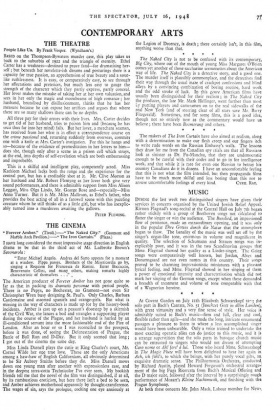THE CINEMA
"Forever Amber." (Tivoli.)--" The Naked City." (Gaumont and Marble Arch Pavilion.)—" The Iron Curtain. (Plaza.) I HAVE long considered the most impressive stage direction in English drama to be that in the third act of Mr. Ladbroke Brown's Savonarola:
"Enter Michael Angelo. Andrea del Sarto appears for a moment at a window. Pippa passes. Brothers of the Misericordia go by, singing a Requiem for Francesca da Rimini. Enter Boccaccio, Benevenuto Cellini, and many others, making remarks highly characteristic of themselves. . . . '
The American producer of Forever Amber has not gone quite so far as that in packing its dramatis personae with period people. There is no Pepys, no Rochester, no Gramont—not even Sir Christopher Wren busy designing St. Paul's. Only Charles, Barbara Castlemaine and assorted spaniels and orange-girls. But what is missing in the way of character's is made up for by the history-book incidents. Amber is cast up on a peasant's doorstep by a skirmish of the Civil War, she lances a boil and strangles a supporting player during the course of the Plague, and her husband is hurled by an ill-conditioned servant into the more fashionable end of the Fire of London. After an hour or so I was reconciled to the prospect, before it was done, of seeing the Defenestration of Prague, the Battle of Bull Run and D-Day. But it only seemed that long ; I got out of the cinema the same day.
Miss Linda Darnell plays the curie at King Charles's court, Mr. Cornel Wilde her one true love. These are the only Americans among a haw-haw of English Californians, all obviously determined to be Sir Aubrey Smiths before they die. Miss Darnell mows down one young man after another with expressionless ease, and in the deepest terra-cotta Technicolor I've ever seen. My bookish friends tell me that the novel of the film was distinguished, if at all, by its rumbustious eroticism, but here there isn't a bed to be seen, and Amber achieves motherhood apparently by thought-transference. The wages of sin, says the prologue, cocking one eye anxiously at the Legion of Decency, is death ; there certainly isn't, in this film, anything worse than that.
* * * The Naked City is not to be confused with its contemporary, Big City, where out of the mouth of young Miss Margaret O'Brien comes yet another of those saccharine sermonettes about the American way of life. The Naked City is a detective story, and a good one. The murder itself is plausibly commonplace, and the detectives find their way through the usual maze of crackpot confessions and blind alleys by a convincing combination of boring routine, hard work and the odd stroke of luck. In this genre American films have usually been distinguished for their realism ; in The Naked City the producer, the late Mr. Mark Hellinger, went further than most Ly putting players and cameramen on to the real sidewalks of the real New York (and of steering clear of all stars save Mr. Barry Fitzgerald). Sometimes, and for some films, this is a good idea, though not so entirely new as the commentary would have us believe ; there have been Boomerang and others.
* * The makers of The Iron Curtain have also aimed at realism, along with a determination to make our flesh creep and our fingers itch to write rude words on the Russian Embassy's walls. The lessons they draw for me from the Canadian spy trials are that all Russians look as sinister as Dr. Fu-Manchu, that they are undemocratic enough to be careful with their codes and to go in for intelligence work, and that while it is rare for even one Russian to betray his country Canadians do it in dozens. I have an uncomfortable feeling that this is not what the film intended, but then propaganda films have to be much more skilful and less boring than this not to
arouse uncomfortable feelings of every kind. CYRn. RAY.


































 Previous page
Previous page